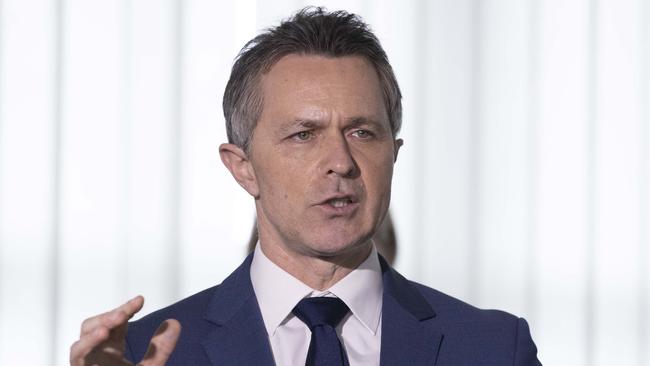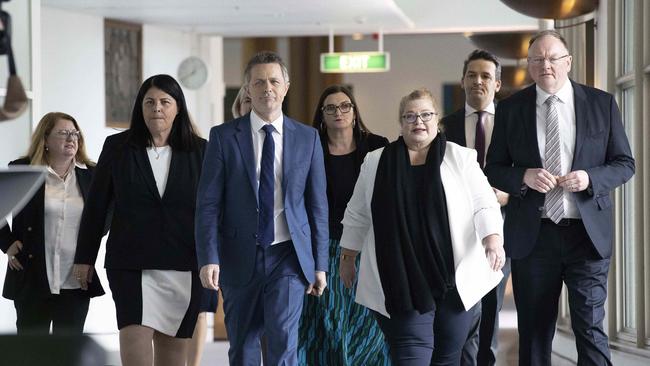School reforms: teacher trap to end brain drain
Paid internships for uni students to work in schools will be part of radical reforms to teacher training, as education ministers fast-track foreign teachers into classrooms.

Paid internships for university students to work in schools will be part of radical reforms to teacher training, as education ministers fast-track foreign teachers into classrooms to plug a crippling skills shortage.
Universities with high dropout rates for student teachers will be punished financially, while more maths and literacy lessons will be woven into education degrees to make graduates classroom-ready.
Federal Education Minister Jason Clare endorsed performance-based pay rises to keep top teachers in classrooms, after a historic meeting with his state and territory counterparts in Canberra on Friday.
In unprecedented reforms, ministers agreed to deliver a national “action plan’’ by year’s end to reform teacher training and stop the brain drain from schools.
Priority citizenship, work rights and fast-tracked visas for foreign teachers and teaching students were also discussed at the meeting. Ministers vowed to ease workloads and boost teacher pay, after hearing from individual teachers and school principals invited to the meeting.
Mr Clare said one teacher’s tale of working 70-hour weeks, and preparing lesson plans after she put her own children to bed, “almost brought me to tears’’.
He said ministers gave “lots of nods’’ to a Universities Australia plan to transform teaching degrees into an apprentice-based model, combining theory with on-the-job training.
He said first-year undergraduates should be embedded in classrooms “right off the bat” for practical training, while final-year students should be paid to work in schools as interns.
“There’s a lot of support for that idea of paid internship,’’ he said. “(It’s about) finally seeing student teachers in the classroom as an asset, rather than as something that just gets in the way, and helps to make sure that young people who are at university know what they’re getting into and that they really want to be there for the right reasons.’’
University of Sydney vice-chancellor Mark Scott – who began his career as a schoolteacher and is a former NSW Education Department secretary – will lead a panel of experts to shake up initial teacher education.
Mr Clare said education degrees must focus on how to teach children to read, noting that just 12 per cent of the content of a four-year Bachelor of Education relates to teaching literacy, with 12 per cent on teaching maths.
“Initial teacher education is screaming out for reform,’’ he said. “We want to make sure that teachers are better prepared for the classroom.’’

Mr Clare said young teachers needed more experienced teachers to “mentor” them.
“They need an induction process, they need some hands-on experience about behaviour management,’’ he said.
Mr Clare said half the university students who enrol in an education degree failed to finish, compared to a dropout rate of 30 per cent in other degrees.
“What’s going wrong there?’’ he said. “If there are changes we can make so that 60 per cent finish a teaching degree, then we will go a long way to fixing the teacher supply issue.’’
Mr Clare flagged changes to university funding, to funnel federally subsidised places to universities with the highest graduation rate, and stripping places from those with high dropout rates. Ministers also agreed to model teacher training on the hands-on hospital internships for student doctors.
“The way unis work with hospitals for medical students is very different to the way that unis work with schools and education departments and teachers,’’ Mr Clare said.
“There might be some lessons for us there, where we can get better practical outcomes.’’
Mr Clare said ministers wanted more career-change professionals to switch to teaching, but had not discussed whether to halve the requirement for a two-year masters degree.
Northern Territory Education Minister Eva Lawler, a former teacher and principal, said ministers wanted to see improvements to teacher training. “For too long, we have felt that initial teacher education hasn’t provided us necessarily, as employers, with the set of teachers that we need with the skill sets that we require in our system,’’ she said.
Queensland Education Minister Grace Grace suggested that teacher quality had flatlined over the past decade.
“We’ve made a lot of changes over the last few years and I don’t know … that we necessarily have a better teacher today than what we had 10 years ago,’’ she said.
NSW Education Minister Sarah Mitchell called for foreign teachers to be fast-tracked for citizenship, as an incentive to teach in Australia – a suggestion the other ministers said they were open to supporting.
Mr Clare said visas for foreign teachers were being prioritised, and suggested that longer work visas be granted to foreign students enrolled in Australian teaching degrees.
Ms Mitchell has appointed professor John Hattie, an expert on ways to improve student learning, to review salaries for high-performing teachers in NSW.
“The starting salary for teachers is pretty good but it’s when you go higher up, and the longer you are in the profession, you do hit that ceiling and feel you’ve got to move into a leadership role or perhaps into a department to get more money and more prestige,’’ she said.
Tasmanian Education Minister Roger Jaensch said the national plan would put a stop to interstate poaching of teachers.
“We can steal each other’s ideas, share each other’s information, and come out with some real solutions to ensure that we’ve elevated the status of teachers and teaching as a profession in this country,’’ he said.
Victorian Education Minister Natalie Hutchins said teachers were suffering from pandemic burnout.
“Teachers are dealing with issues that they’ve never had to deal with in the past, with increased mental health (issues) on the rise for students,’’ she said.
The education ministers agreed to increase the number of teachers with Highly Accomplished and Lead Teacher certification, with “awards and honours’’, as well as pay, to reward high performers.
Federal opposition education spokesman Alan Tudge said the challenge would be to “deliver concrete action that will improve the education of students and reward teacher excellence’’.





To join the conversation, please log in. Don't have an account? Register
Join the conversation, you are commenting as Logout